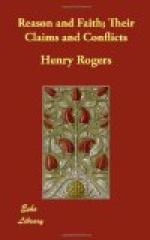The corruptions in the Scriptures from these causes are likely to be even less than in the case of any other writings; from their very structure,—the varied and reiterated forms in which all the great truths are expressed; from the greater veneration they inspired; the greater care with which they would be transcribed; the greater number of copies which would be diffused through the world,—and which, though that very circumstance would multiply the number of variations, would also afford, in their collation, the means of reciprocal correction;—a correction which we have seen applied in our day, with admirable success, to so many ancient writers, under a system of canons which have now raised this species of criticism to the rank of an inductive science. This criticism, applied to the Scriptures, has in many instances restored the true rending, and dissolved the objections which might have been founded on the uncorrected variations; and, as time rolls on, may lead, by yet fresh discoveries and more comprehensive recensions, to a yet further clarifying of the stream of Divine truth, till ‘the river of the water of life’ shall flow nearly in its original limpid purity. Within such limits as these, the most consistent advocate of Christianity not only must admit—not only may safely admit—the existence of discrepancies, but may do so even with advantage to his cause. he must admit them, since such variations must be the result of the manner in which the records have been transmitted, unless we suppose a supernatural intervention, neither promised by God nor pleaded for by man: he may safely admit them, because—from a general induction from the history of all literature—we see that, where copies of writings have been sufficiently multiplied, and sufficient motives for care have existed in the transcription, the limits of error are very narrow, and leave the substantial identity untouched: and he may admit them with advantage; for the admission is a reply to many objections rounded on the assumption that he must contend that there are no variations, when he need only contend that there are none that can be material.




